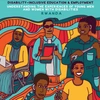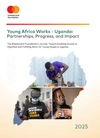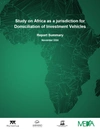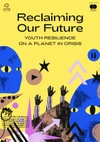Executive Summary
- This research explored the lived experiences of young men and women with disabilities in Rwanda through in-depth interviews with 30 young persons with disabilities. The study included a mix of participants with various disabilities (including physical, visual, hearing, psychosocial, and intellectual impairments), aged between 15-35 years, based in urban and rural parts of Rwanda. Participants were purposively selected to reflect varied access to education and vocational training, employment in the agricultural and the tourism sectors.
- The experiences of youth with disabilities who attended special needs schools varied greatly from those who attended mainstream schools. These contrasting experiences are shaped by several interlinked factors such as inclusive teaching practices as well as availability, proximity, and affordability of special needs schools.
- Experiences of youth with disabilities during education were mainly shaped by inaccessibility and lack of accommodations. Some of these difficulties were countered by support from peers.
- Despite being skilled and educated, many young people with disabilities faced challenges securing employment for reasons that included discriminatory hiring practices. During this transitionary period, some young people engaged in vocational training and work placements.
- Youth with disabilities engaged in work in the agricultural sector faced challenges including difficulties related to type of impairment, and those stemming from negative attitudes. Participants reported needing training in several aspects related to agriculture.
- Young people with disabilities faced many challenges in finding work in the tourism sector, including limited availability of training, and discriminatory practices among employers.
- Access to assistive products and to digital skills training were noted as facilitating factors in education and employment. Support from family members, friends, peers, and community members were also strong enablers of participation and attainment.
- Many youth participants had experienced stigma including negative attitudes and stereotypes, bullying, violence and abuse, and discrimination and exclusion in education and employment settings. Drivers of stigma included a lack of awareness of the capabilities of youth with disabilities, and misconceptions around disability.
- This study also explored the intersectionality of other factors with disability in shaping youth experiences. The visibility of a person’s impairment can influence how they are perceived and treated by the community. Women with disabilities experience compounded discrimination as both disability and gender carry forms of marginalisation and stigma.
- The evidence indicates a gap between young people’s aspirations and opportunities available to them. These were most influenced by discriminatory attitudes and financial barriers.
- Recommendations included stronger policy implementation and enactment of laws to increase inclusiveness of persons with disabilities; improved support and funding to educational institutions to strengthen inclusive practices; more efforts to create awareness and sensitise employers and communities to address drivers of stigma; wider availability of assistive products and digital skills; and wider range of interventions and financial support options to better match the aspirations of young people with disabilities with opportunities.
About the Series:
“Disability-Inclusive Education and Employment”
Recognizing that meaningful inclusion for young people with disabilities starts with listening and learning, the Mastercard Foundation developed a research program to map the policy landscape and to hear directly from young people with disabilities.
This research was carried out in partnership with the International Centre for Evidence in Disability at the London School of Hygiene & Tropical Medicine (LSHTM), the University of Abuja, the University of Ghana, Lifetime Consulting Ltd, Addis Ababa University, University of Nairobi, Global Advocacy and Research Group and MRC/UVRI & LSHTM Uganda Research Group.
Two report series have been developed, covering the Mastercard Foundation’s seven countries of focus – the first on the context, the second elevating youth voices.
Briefs summarizing the key findings of each report have been prepared by Dr. Xanthe Hunt in collaboration with LSHTM and the Mastercard Foundation’s research team.




